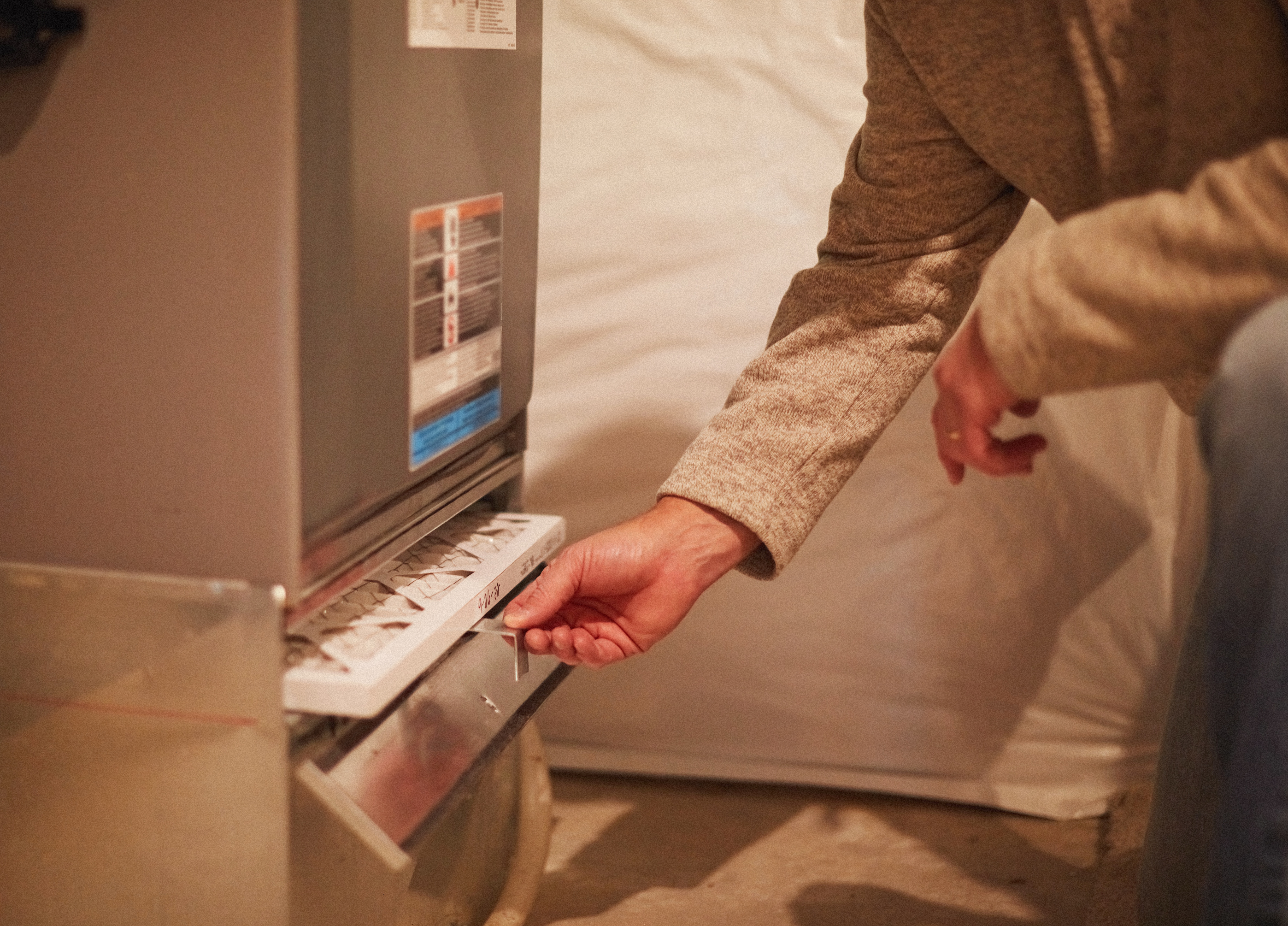Keeping a clean filter in your furnace is a great way to protect the quality of your indoor air. It’s also vital for ensuring optimum heater performance and preventing problems like overheating and short cycling. Although they’re easy to forget, regular HVAC filter changes are among the most important parts of your ongoing home maintenance. The following is everything you need to know about setting the right filter change schedule for your Gurnee, IL home.
General Recommendations for Furnace Filter Changes
Homeowners are advised to inspect their furnace filters monthly and change them every 30 to 90 days. This schedule is generally sufficient for avoiding major, filter-rated problems and keeping the indoor air relatively clean. However, it isn’t guaranteed to be the best schedule for your home or household.
How to Tell If Your Air Filter Is Dirty
During monthly filter inspections, you should take this component out and hold it up to the overhead light. If light can still pass through it, air can move through it as well. When built-up filter debris is heavy and opaque, this thick, lint-like material will inhibit airflow throughout the entire HVAC system.
Honoring the Terms of Your Manufacturer’s Warranty
All new heating equipment comes with a manufacturer’s warranty. Most new furnaces come with a 10-year limited parts warranty and a 20-year warranty on the heat exchanger. Throughout the duration of your furnace’s warranty, you’re required to adhere to the terms of this mutually binding agreement.
Just as warranty issuers promise to pay for replacements and repairs resulting from defective parts or improper assembly, homeowners promise to take reasonable measures to keep their equipment intact. Regularly changing air filters is one of them. In fact, some warranty agreements establish a required schedule for filter changes with most stating either every 30 to 60 days or every 30 to 90 days as the minimum frequency. Neglecting this essential maintenance could result in the automatic voidance of your furnace manufacturer’s warranty. It could even affect all other HVAC protections supplied by your home insurance policy and home service agreement.
Check Your HVAC Air Registers and Vents
Delayed filter changes can have a visible impact on the HVAC air registers, vents, and grilles throughout your home. When collected debris exceeds a furnace filter’s capacity, small amounts of this lint-like material break off and move through the air distribution system. If excess moisture is present in your ducting due to poor airflow and other filter-related challenges, some of this blown-off debris will get stuck in your ductwork. The rest will collect just behind your air vents and coat the interior of your vent covers and grilles.
Checking your HVAC air vents for buildups will help you determine whether you’re changing your air filter often enough. You can remove dust and other accumulations from these features using a soft, damp cloth. You can also unscrew vent covers and gently vacuum behind them.
Why Your Landscaping Matters
If you recently moved into a new home and have yet to landscape your outdoor areas, you may need to check your furnace filter every two weeks and change it monthly. Whenever there are loose soils and limited dust control at the exterior of a building, there are usually high concentrations of airborne particulates indoors. Installing grass, turf, or hardscaping features will limit the need for filter changes and give your IAQ a considerable boost.
Similar IAQ concerns exist whenever there’s active construction in the neighborhood. If a builder just broke ground on a nearby lot, start checking your HVAC air filters more often until local construction has ceased.
How the Location of Your Property Affects Your Filter Change Schedule
Concentrations of airborne debris are often higher in and around homes that are located near freeways and busy streets. If you purchased property that’s surrounded by heavy traffic, you can count on having to check and change your furnace filters more often than you would if living in a remote, low-traffic area.
Establishing the Right Filter Change Schedule When You Have Pets
Households with indoor pets should check their air filters every two to three weeks. Buildups of pet hair and pet dander can overwhelm HVAC air filters within very short periods of time. This is especially true during the winter months when cats, dogs, and other animals spend more time indoors and are more prone to scratching, shedding, and dry skin.
What It Means When Your Filter Needs Changing Every Two to Three Weeks
Even if you don’t have pets living in your home, you might find it necessary to check and change your filter every two to three weeks. Certain types of carpeting and textiles release tiny fibers into the air. These enter HVAC systems and get trapped by air filters. For instance, some carpeting is composed of many short, twisted strands to form texture, and it releases loose filaments throughout its lifespan.
Whether due to the materials used in your home or resident activities, ongoing IAQ concerns place an extra burden on both furnace filters and furnaces themselves. They also have a marked impact on human health, especially for residents with allergies, asthma, or other chronic respiratory illnesses.
Although changing your filter often can limit the impact that your IAQ concerns have on your health and your heating equipment, it’s often more economical and far more effective to install integrated IAQ equipment instead. Installing a whole-house air purifier, media filter, or air scrubber will decrease concentrations of all airborne contaminants, extend the life spans of your furnace filters and furnace, and create a cleaner, fresher-smelling, and more comfortable living environment overall.
Furnace Filter Ratings and Their Impact on Filter Change Schedules
All furnace filters sold throughout North America have maximum efficiency reporting value (MERV) ratings. MERV ratings range from one to 20, and the more highly rated a filter is, the more particulate matter it can remove. Most furnaces come with standard, pre-installed air filters that have MERV ratings of four to six. They pick up dust, pet hair, carpet and textile fibers, pollen, and many other relatively large-sized particulates.
Upgrading to a filter with a higher MERV rating will provide better protection for your heating equipment and lungs. Moreover, higher-rated filters don’t have to be changed as often. For instance, if you’re still using the standard filter that came with your heater, you should stick to the general recommendation of checking it monthly and changing it every one to three months. If you have a filter with a MERV rating of nine to 11, you may be advised to inspect it every three months and change it every three to six months. Filters with MERV ratings of 12 or higher can remain functional for as long as 12 months but should be routinely inspected throughout the year.
However, it’s important to note that higher MERV ratings cause a fair amount of HVAC system stress. The closer-knit mesh and multi-stage filtration that these components supply can impede normal airflow. This is particularly true of filters with MERV ratings of 12 to 13 or higher. At this level of filtration, it’s important to have air balancing and other HVAC services and modifications performed by a licensed technician.
How to Safely Upgrade Your HVAC Air Filter for Improved IAQ
The best time to upgrade your furnace filter is right around your annual HVAC maintenance service. This way, you can work with an HVAC technician to determine the right MERV rating for reaching your IAQ goals without harming HVAC performance. You can also get a needs-specific recommendation for your ongoing filter change schedule.
Since 1948, we’ve been proudly serving Gurnee, IL and the surrounding communities. Our clients can count on us for top-notch heating, cooling, plumbing, and indoor air quality services. We also provide air duct cleaning, combi boilers, and RTU systems. To find out more or schedule an appointment, give us a call at Modern Heating and Plumbing today.


